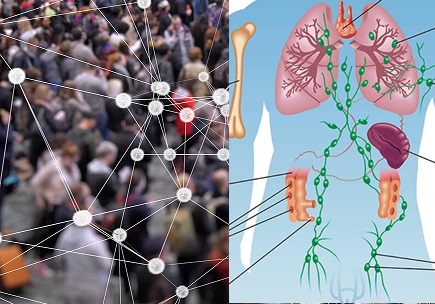The word epidemiology was coined from three different Greek words: epi (upon or on), demos (population or people) and logos (study of). Epidemiology (which is the basic science of public health) therefore is defined as the field of medical science that studies the occurrence, distribution, and determinants of disease and health-related issues, and the application of same in the control and prevention of an infectious process and a pathologic state in a defined human community/population. Scientists that study epidemiology are known as epidemiologists. Epidemiologists study healthy individuals, sick people, exposed individuals, non-exposed individuals in order to know the proportion of people who get a given disease and why and, also to determine the key effect of the disease on exposed members of a given community/population. They are disease detectives who also ensure proper public health in a defined population because epidemiologists are not only concerned about the death or disability of any people, but it is even more interested on how to maintain positive health states of individuals and on how to improve and sustain it in a given human population.
Epidemiology is the bedrock of public health, and it is one of the most important tools used for public health delivery services in a given population. It aids planning and the development of health programs and services which are all geared towards prevention of disease outbreak and the establishment of control measures in areas where the diseases have been spotted. Studies in epidemiology help to track the spread of disease and identify the causative organisms and; how the disease is transmitted to susceptible individuals within the population. Health, according to the World Health Organization (WHO), is defined as a state of complete physical, mental and social, spiritual wellbeing and not merely the absence of disease or infirmity (i.e. ill-health).
It is the condition in which the body of a living organism (in this case a human) performs its functions normally and properly without any hindrances due to health related issues. Health is a state of equilibrium or balance between a host and a disease-causing microorganism (pathogen) in a given population or environment. Disease on the other hand is the impairment of one or more organs of the body which hinders an individual from performing its normal vital functions and activities. It is usually the body’s response to some environmental factors including malnutrition, infectious microorganisms, inherited diseases, industrial hazards, climatic changes or a combination of any of these listed factors.
As a basic medical science, epidemiology is used to obtain practical data which are interpreted and used for the development of interventions and programs geared towards a better public health. It sees to the efficient allocation of efforts and resources for health promotion, maintenance of good health, and medical care in a defined human population. Unlike other medical/biomedical sciences, epidemiological studies are usually undertaken by looking at the frequency of exposure to an infection/disease or certain key features of disease in a particular population rather than the disease itself. Epidemiology as a discipline in public health not only studies disease distribution and factors related to them but it is also geared towards preventing an outbreak of a disease in a particular population/community through the implementation and introduction of specific intervention and control measures especially in those scenarios where the diseases have already been spotted. The results of every epidemiological research are used to prevent and control diseases/infections through targeted influence of public health policy that are implemented by way of improvement in health care programs.
References
Aschengrau A and Seage G.R (2013). Essentials of Epidemiology in Public Health. Third edition. Jones and Bartleh Learning,
Aschengrau, A., & G. R. Seage III. (2009). Essentials of Epidemiology in Public Health. Boston: Jones and Bartlett Publishers.
Balows A, Hausler W, Herrmann K.L, Isenberg H.D and Shadomy H.J (1991). Manual of clinical microbiology. 5th ed. American Society of Microbiology Press, USA.
Bonita R., Beaglehole R., Kjellström T (2006). Basic epidemiology. 2nd edition. World Health Organization. Pp. 1-226.
Brooks G.F., Butel J.S and Morse S.A (2004). Medical Microbiology, 23rd edition. McGraw Hill Publishers. USA.
Castillo-Salgado C (2010). Trends and directions of global public health surveillance. Epidemiol Rev, 32:93–109.
Centers for Disease Control and National Institutes of Health (1999). Biosafety in Microbiological and Biomedical Laboratories, 4th edn, Washington DC: CDC.
Champoux J.J, Neidhardt F.C, Drew W.L and Plorde J.J (2004). Sherris Medical Microbiology: An Introduction to Infectious Diseases. 4th edition. McGraw Hill Companies Inc, USA.
Gordis L (2013). Epidemiology. Fifth edition. Saunders Publishers, USA.
Guillemin J (2006). Scientists and the history of biological weapons. European Molecular Biology Organization (EMBO) Reports, Vol 7, Special Issue: S45-S49.
Halliday JE, Meredith AL, Knobel DL, Shaw DJ, Bronsvoort BMC, Cleaveland S (2007). A framework for evaluating animals as sentinels for infectious disease surveillance. J R Soc Interface, 4:973–984.
Lucas A.O and Gilles H.M (2003). Short Textbook of Public Health Medicine for the tropics. Fourth edition. Hodder Arnold Publication, UK.
MacMahon B., Trichopoulos D (1996). Epidemiology Principles and Methods. 2nd ed. Boston, MA: Little, Brown and Company. USA.
Nelson K.E and Williams C (2013). Infectious Disease Epidemiology: Theory and Practice. Third edition. Jones and Bartleh Learning.
Porta M (2008). A dictionary of epidemiology. 5th edition. New York: Oxford University Press.
Rothman K.J and Greenland S (1998). Modern epidemiology, 2nd edition. Philadelphia: Lippincott-Raven.
Rothman K.J, Greenland S and Lash T.L (2011). Modern Epidemiology. Third edition. Lippincott Williams and Wilkins, Philadelphia, PA, USA.
Discover more from Microbiology Class
Subscribe to get the latest posts sent to your email.





